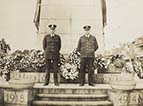Redress and Apology
I would say to [the Prime Minister]: Look it, you have an obligation to the children of internees. They suffered hardships because your underlings exploited the authority that they had by disallowing us assistance. If I didn't have my grandparents, either my mother would be washing floors or on the streets. One of the two. So I was lucky. So, what the problem is—I mean you don't even say you're sorry. Or thank you, or go to hell.
Attilio Girardi, son of internee Bruno Girardi, video interview, Columbus Centre Collection
I have more feelings towards people of Japanese descent [than Italian Canadians]. I figured they got a dirty deal when they were interned. Because to me it wasn't a selective internship for them. It was just everybody.
Rino Albanese, son of enemy alien Giovanni Albanese, video interview, Columbus Centre Collection
I would not expect to be compensated. I'm not of that school that thinks for every little thing that goes on you have to be compensated.
Nellie Cavell, enemy alien, Vancouver, video interview, Columbus Centre Collection
In as much as the soldiers have been honoured [in the Peace Tower in Ottawa], I think the people who have been falsely accused of something should be honoured in the same way. Their names should be written down as a memorial.
Sandy Corbo, granddaughter of internee Achille Corbo, Montreal, video interview, Columbus Centre Collection
Attempts at redress have been controversial among Italian Canadians. Some feel that Italian Canadians should receive financial compensation or, at the very least, be given a public apology by the prime minister in the House of Commons. Others believe that it is too late for an apology since the majority of internees and enemy aliens have passed away.
Redress initiatives began after World War II. Former internees in Hamilton and Montreal petitioned the Canadian government for lost wages, lost businesses and emotional distress. They were unsuccessful.
In January 1990, the National Congress of Italian Canadians (NCIC) published a brief asking the federal government to compensate Italian internees wherever possible. They also requested that the government apologize to Italian Canadians for the treatment they received during the internment years. Later that year, Prime Minister Brian Mulroney expressed an apology at a luncheon held north of Toronto.
In Prime Minister Paul Martin’s 2005 federal budget, the Canadian government set aside $25 million to address the claims of several communities seeking redress for internment, confiscation of property and businesses, and alienation. This was called the Acknowledgement, Commemoration and Education (ACE) Program. It was not the formal apology many had hoped for, nor would it provide compensation to the families affected. The fund was designated primarily for educational initiatives. When Prime Minister Stephen Harper’s government took office in 2006, it replaced the ACE Program with the Community Historical Recognition Program (CHRP), which was established to formally distribute monies to community initiatives.
In 2009 Massimo Pacetti, Liberal MP for Saint Léonard-Saint Michel, introduced Bill C-302 in the House of Commons. The bill called for the creation of a foundation to develop educational materials on Italian Canadian history – to be used in schools and cultural centres – and a commemorative stamp. Bill C-302 did not pass through the necessary stages to become law.
Things to Consider
• The internment period is a little-known event, even among the Italian Canadian community. In fact, the majority of Italian Canadians today have a different family history of the war. Their wartime stories centre on service in the Italian military, Nazi patrols and occupation, Allied bombings, resistance efforts, as well as hunger and depravation. What happened in Canada is not part of the majority's “personal” history.
• In 1940, the Italian community in Montreal was the largest in the country and the most affected by the internment and wartime designations. Montreal is now second to the Toronto-based Italian community, whose vast majority represents post-war immigrants. As a result, the voice of the Toronto community, with its interests and needs, is the one that is most often heard in public.
• The Italian Canadian community has not embraced the internment as part of its collective history. Although much valuable work was undertaken in the 1990s, it has not taken root. A genuine debate and dialogue throughout the community did not result; and as a consequence, the community does not have a unified position to advocate to the Canadian government and the Canadian public.



